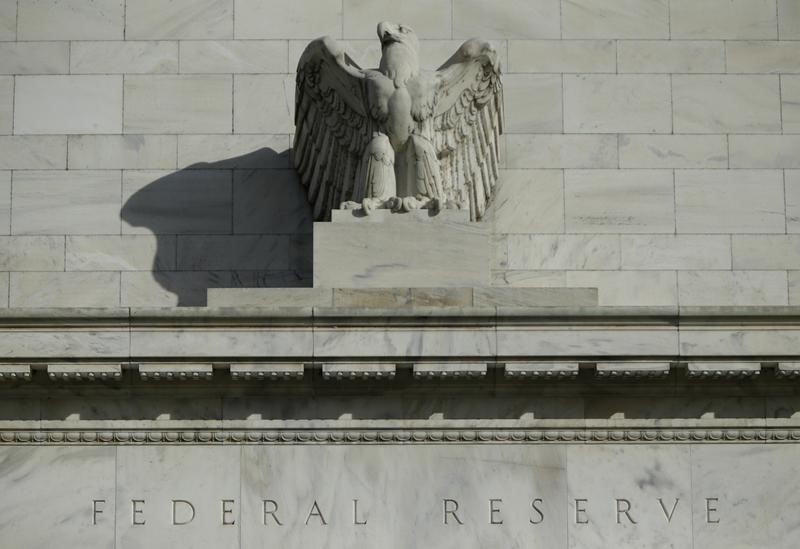By Jonathan Spicer, Michael Flaherty and Ann Saphir
(Reuters) - A U.S. Treasury official and a director at the New York Federal Reserve are among those who have been considered to replace two hawkish Fed policymakers, according to people familiar with the searches.
Final decisions are not imminent in the efforts to find successors to Philadelphia Fed President Charles Plosser, who steps down March 1, and Richard Fisher of the Dallas Fed, who retires on March 19.
But the clock is ticking to fill those positions, with names beginning to surface as potential candidates.
Matthew Rutherford, whose stint as Treasury's top domestic finance official ended on Friday, was under consideration at least in early stages of the searches, according to three sources. James McAndrews, who heads up research at the neighboring New York Fed, was considered for the job in Philadelphia, where he once worked.
It was unclear whether a short list for either opening had been assembled yet.
Regular golfing partners, Plosser and Fisher are ardent inflation hawks who have repeatedly dissented against the easy money path pursued by Fed Chair Janet Yellen and her predecessor, Ben Bernanke. While most of the 12 regional Fed presidents vote on monetary policy only every three years, they always help shape the debate both behind closed doors and in public speeches.
The parallel searches have gained momentum since December. According to one person called for advice, the Philadelphia Fed is seeking someone with the academic background to take the reins from Plosser, a former professor. A person familiar with the Dallas Fed's effort said the search committee was looking for a candidate with similar policy leanings as Fisher.
Moody's Analytics chief economist Mark Zandi, who lives in the Philadelphia area, has also come under consideration to replace Plosser. Michael Dotsey is said to be in contention as well given he heads research at the Philadelphia Fed, though he is less known throughout the central bank.
Another Treasury official, Seth Carpenter, was seen as a long shot for the Philadelphia position, but he was expected to stay on at the agency.
All of those mentioned declined to comment, or were not available. The search committees at the regional Fed banks also declined to comment, citing the ongoing effort, as did the banks themselves.
NEW VOICES
While Rutherford's monetary policy leanings are unclear, his expertise on financial markets is well established. A Treasury star in his mid 30s, Rutherford, as assistant secretary for financial markets, played a key role in managing the federal government's massive borrowing operations during and following the 2007-8 financial crisis.
McAndrews is considered broadly aligned with New York Fed President William Dudley's dovish leanings on policy, though his public comments tend to focus on the lingering threat to the financial system from too-big banks and short-term funding markets.
Zandi is a prominent economist, centrist-leaning on monetary policy, whose frequent media appearances give him a wide profile. In 2013, President Barack Obama considered picking him as the director of the regulator that controls federal home lenders Fannie Mae and Freddie Mac, but Zandi remained at Moody's.
Governors at the Washington-based Fed Board typically interview each of three final candidates offered by the regional Fed banks. Although it's rare, the Fed Board has in the past rejected regional Fed banks' preferred candidate, according to former St. Louis Fed President William Poole and several others involved in past searches.
While the Fed Board could use its influence to help install policymakers who may back a more cohesive message from the central bank in years ahead, it may be loathe to exert it, said Michael Hanson, an economist at Bank of America Merrill Lynch.
"The Fed values the institutional framework that brings disparate views together," Hanson said.
Plosser and Fisher, whose banks won't reclaim a voting spot until 2017, cast two of three dissenting votes against the Fed's December decision to say it could be "patient" in mulling a rate rise, the most opposition Yellen has faced since becoming chair a year ago. She faced no dissents at the latest policy meeting on Wednesday.
While the search committees in Philadelphia and Dallas are considering candidates from inside and outside the Fed, insiders could well have the upper hand: eight of the 12 current Fed presidents came from the central bank's internal ranks.

If a suitable successor is not found before the presidents retire, the first vice presidents - Blake Prichard for Philadelphia, and Helen Holcomb for Dallas - would become acting presidents.